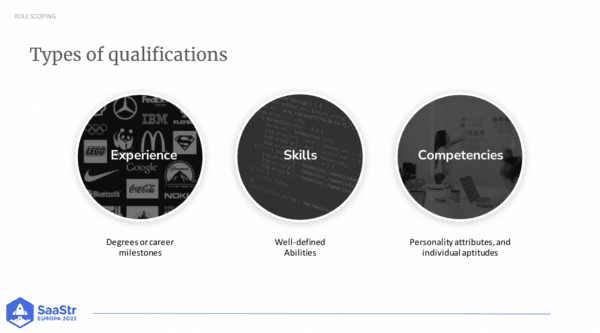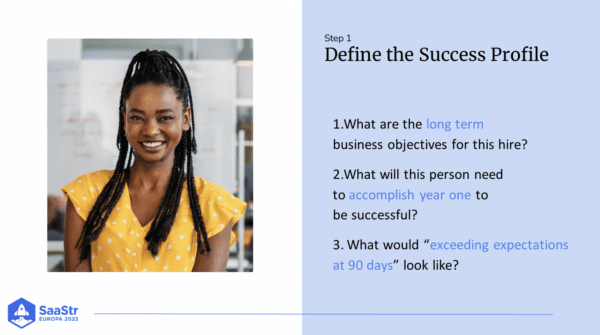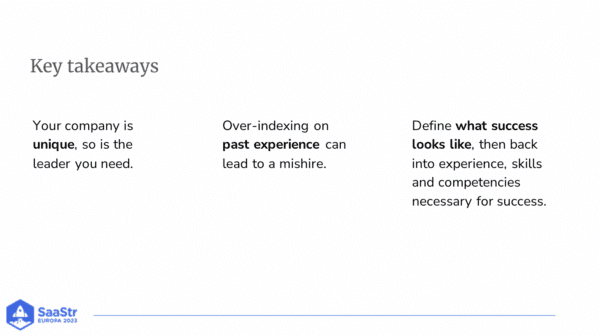A strong sales leader is vital to any company hoping to scale. With this in mind, hiring for the Head of Sales role is one of the most important things a business can do. Unfortunately, too many companies focus on the wrong things when hiring their sales leaders, which can lead to hires that aren’t the best fit for the business.
Fortunately, there are ways to avoid common hiring mistakes. Greenhouse Head of Sales EMEA Renu Jhugaroo and Growth by Design Founder Jill Macri share the crucial steps to hiring sales leaders with confidence.
Your Company is Unique, and So Is the Sales Leader You Need
If you gathered a room full of sales leaders from different companies, no two would be quite the same. Each will have a unique leadership style, sell different products, target different markets, lead different teams, and build distinctive growth strategies. Macri emphasizes that execs should remember this when recruiting: “There’s not just one perfect sales leader.”
To show how choosing a great fit, Jhugaroo and Macri use an example scenario below to illustrate what the three-step process might look like. Keep this example in mind as you learn the crucial hiring steps.
Imagine that you are the Founder of a startup called ABC Company. Until now, you have been doing most of the sales and have a small AE team. You will be looking for someone to manage and scale the team.

Understanding Qualification Types
Building a solid, clarified hiring strategy is a bit like building your product roadmap; you decide what functions and tools are necessary, what qualifications you need, and how to prioritize. Macri says, “Really clarifying what you need in a hire is something a lot of leaders never learn to do well, and it can make the difference between an excellent hire and a mis-hire.”
However, it is important to understand that there are different qualification types before you move forward, creating your must-haves in your search.
Types of Qualifications:
Experience: Degrees or career milestones.
- These are accomplishments, education, experience, and other things you can easily see on someone’s resume. (Ex. For Sales leaders, this may be someone with management experience or hired a team.
Skills: Well-defined abilities.
- Skills can be things someone has learned during their career, or they can learn them on the job. (Ex. For Sales leaders, this may be negotiation skills, mastery of a certain sales tool, qualifying customers, hiring, etc.)
Competencies: Personality attributes and individual aptitudes.
- Competencies encompass a broader bucket that overlaps through all the qualifications. They often transfer with an individual role-to-role. These natural strengths can be harder to train and upskill, and often they are unique to a person. As Macri says, “Generally, we find that high performers are strong in certain competencies.” (Ex. Collaborative, self-starter, results-driven.)
It’s important to bucket qualifications this way because founders often use the experience bucket as a proxy for the other two buckets and do not dig any deeper. When founders do this, they fail to test critical qualities, which can lead to mis-hires.
Secondly, from a diversity perspective, if you focus on specific competencies and skills rather than experience alone, you can open up your options. You’ll likely find a higher-quality and more diverse talent pool.

Step One: Define the Success Profile
The first step to hiring your dream sales leader is to define what success in the role looks like at your company. Begin by asking yourself these three basic questions:
- What are the long-term business objectives for this hire?
- What will this person need to accomplish in year one to be successful?
- What would “exceeding expectations at 90 days” look like?
This step is great for hiring roles for which you may not have much experience. Thinking back to our ABC Company Founder example, let’s break down what defining success would look like:
| Define Success In Year One |
|
| First 90 Days – Exceeding Expectations |
|

Step Two: Determine Qualifications Necessary to Achieve Success
To achieve the successful outcomes above, there are specific qualifications in each bucket that will be necessary. Continuing with the ABC Company example, here’s what those qualifications may be.
Experience Bucket:
- Successful, relevant sales experience.
- Leadership experience.
Jhugroo believes that for ABC Company, typical sales skills will be worth consideration, but seniority is not necessarily the most telling indicator of suitability. “Sales skills would definitely be important. I wouldn’t, however, put, let’s say, five years of experience. I want to be a lot more specific about what I’m looking for.”
You need to understand what matters most to your business and think clearly about what experience is relevant to your position. Jhugaroo comments, “It may actually be better to be hiring somebody with only only one year of volume sales experience versus somebody that has ten years of large enterprise sales, for example.”
Skills Bucket:
- Talent
- Ability to scale a quality team.
- Coaching & mentoring.
- Process
- Ability to build effective processes.
- Sales skills (negotiation, qualifying customers, persona development, pipeline strategies, etc.).
When you consider a candidate, it’s important that they have built a long-term strategy that delivers clear and growth-centered results. This sales strategy will be built and supported across the leader’s Skills and Competency buckets. Jhugaroo explains, “Any sales leader needs a strategy that’s long-term to be successful. And I tend to think about that strategy in four pillars: So we have talent, process, see driving results, and relationships.”
Competencies Bucket:
- Drive Results:
- Adaptability.
- Demonstrated growth mindset, curiosity, and ability to learn.
- Self-starter.
- Relationships:
- Collaboration
- Communication
- Customer Focus
Step Three: Prioritize
From the previous step in determining what qualifications matter for your business, then you should rank those in order of importance within each bucket. Returning to the ABC Company example, here is a ranking of the most critical qualifications to look for:
| Qualifications | Experience | Skills | Competencies |
|
|
|
This table shows how the founder of the ABC Company startup might rank their list. And this ranking will be unique for every company based on things like product, target market, and relationships.
Prioritization is very difficult and also very important. Firstly, it is the key to optimizing the hiring process because it tests for the most important things first. This approach will save time and boost efficiency.
If you’re trying to check every box, filling roles can be difficult. Aligning the recruitment process toward the top-priority qualifications leads to the best talent.

Key Takeaways
- Your company is unique, and so is the leader you need.
- Over-indexing on past experience can lead to a mis-hire
- Define what success looks like, then back into experience, skills, and competencies necessary for success.

